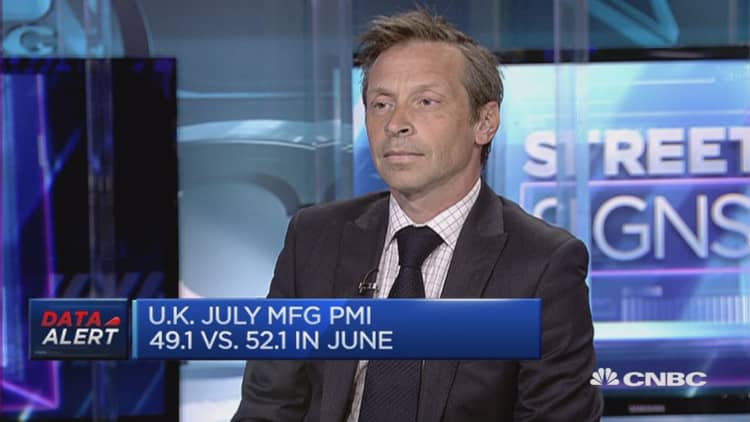
Business activity in the euro zone did not fall as much as expected in July, according to the latest survey of manufacturing and services activity in the 19-country region.
A preliminary purchasing managers' index (PMI) for the manufacturing and service sectors rose to 52.9 in July, above expectations for a reading of 52.5 according to analysts polled by Reuters.
Still, the July survey, compiled by Markit, showed a slight drop from June's final figure of 53.1, making this month's reading the lowest level since January 2015. The 50-point mark separates expansion from contraction.
There had been fears that political and economic uncertainty in the euro zone following Britain's decision in June to leave the European Union could impact business activity more severely but stronger-than-expected figures from France and Germany helped to buoy the index.
Markit's Chief Economist Chris Williamson said the flash PMI data showed that the euro zone economy had shown "surprising resilience in the face of the U.K.'s vote to leave the EU and another terrorist attack in France. The overall rate of economic growth is largely unchanged, suggesting GDP is growing at a sluggish but reasonably steady annual rate of around 1.5 percent," he said, remarking in the data release.
"It's especially encouraging to see employment growth continuing to improve, with firms' appetite to hire seemingly so far unaffected by the uncertainty caused by the Brexit vote, especially in Germany," he added.
Breaking down the figures, French business activity held up better than expected in July despite the Bastille Day truck attack in Nice and concerns about a Brexit.
The preliminary purchasing managers index for the manufacturing and service sectors rose to 50.0 from 49.6 in June, Markit said, confounding a Reuters poll forecast for a slight drop to 49.2. Fifty is the mark dividing contractions in activity from expansions, meaning activity has held steady in the month after shrinking a little in June.
Meamwhile German private sector growth hit its highest level so far this year, suggesting Europe's biggest economy is brushing off any uncertainty caused by Britain's vote to leave the European Union.
Markit's flash composite Purchasing Managers' Index, which tracks the manufacturing and services activity that accounts for more than two-thirds of the German economy, rose to 55.3 from 54.4 in June.
This was the highest reading since December 2015 and beat a Reuters consensus forecast for 53.7. The headline figure has now been comfortably above the 50 line that separates growth from contraction for 39 months in a row.
The resilience in France came largely from the service sector, where the index rose to a better-than-expected 50.3 from 49.9 in June as the flow of new business improved and firms increased headcount.
The index for manufacturing remained in contraction territory, although it improved to a four-month high of 48.6 from 48.3 in June instead of the deterioration expected by economists polled by Reuters.
New orders from abroad grew for the first time in seven months, which Williamson said might reflect a weaker euro or that French firms might be picking up some business from British competitors after the Brexit referendum in June.
The resilience seen in the PMI survey chimed with a broader business confidence poll published on Wednesday by France's INSEE statistics agency showing morale rebounding unexpectedly in July.

